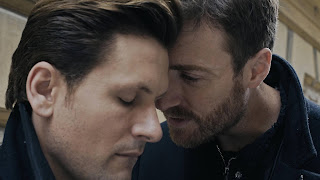Movie Review - Sorry Angel
One of those subtle ways is in how a person who is sick gets revealed as having HIV or AIDS. It's not in the pointed way in which Tom Hanks' character in Philadelphia (1993) is revealed to have horrible lesions on his torso. The reveal of the lesions here is more casual. Arguably, the reveal is even lighthearted and playful. The reveal occurs in one of the most sensual if sentimental bathtub scenes in a very long time or ever.
For the most part, this is a same-sex romance between a young and relatively older male. Both are white men. Both are French. Both are cute, funny, sexy and adorable. One particular moment involves a late night walk to a hotel. Watching them come together and bounce off each other is equally so.
Pierre Deladonchamps (A Kid and Stranger By the Lake) stars as Jacques, an author based in Paris promoting his latest work, while juggling several interpersonal relationships, including having a son nicknamed Loulou. Vincent Lacoste (Hippocrate and The French Kissers) co-stars as Arthur, an aspiring filmmaker, based in Brittany, which is a state on the west coast of France. Arthur juggles a relationship with a woman with whom he seems to live, as well as numerous affairs with men.
The film seems to openly interrogate Arthur's lifestyle or his choices. Literally, Arthur's girlfriend interrogates him in a tent. It could simply be a reflection of French culture that his affairs are treated with a laissez-faire attitude. His affairs seem to be of no consequence. Given the HIV/AIDS epidemic, which both Arthur and his girlfriend would know, it's strange that she never mentions it. She in fact never worries about her safety or if she's been exposed.
Unlike Paris 05:59: Théo & Hugo, this film is not really about the fear of contracting the virus, which something like Philadelphia touched upon. It's not about prevention or the inherent homophobia surrounding that, which was the thrust of films like The Normal Heart (2014) or BPM (Beats Per Minute). This film is more about dealing with a complicated love that has sickness and illness as a backdrop. It then becomes about how to love and be loved with sickness and illness as a forefront.
When it comes to that, this film doesn't trump The Normal Heart or even the masterpiece that is Angels in America (2003). However, this film isn't aiming to be the big, bold spectacle that those properties were. Honoré is trying to be more low-key, quieter, more nuanced. In that, he succeeds. He runs the risk though of it being inconsequential.
When it comes to queer cinema, the HIV/AIDS epidemic could be seen as tantamount to the Holocaust. So many people got sick and were lost. Telling their stories or as many stories about that time feels vital, but this film doesn't have the emotional thrust of André Techiné's The Witnesses. Jacques and Arthur are hot together, but their romance doesn't hit as hard.
The character of Jacques is said to compartmentalize his relationships. The filmmaker appears to be doing the same. It may be an artistic choice that is appropriate, but it gives the film an emotional disconnect. The performances are winsome though.
Plaire, aimer et courir vite
Not Rated but contains sexual situations and nudity.
Running Time: 2 hrs. and 12 mins.
In select theaters.
Available on DVD/VOD on May 21.














Comments
Post a Comment